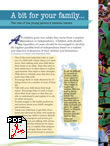- TOOL KITS
- A. The NEXT Step
- B. Promoting Independence
- C. Phone Apps
- D. Return to Work
- E. Motivational Interviewing
- F. Paediatric Brain Injury Rehabilitation Resources
- a) Introduction
- 0. Introduction
- 1. Transition
- 2. The transition wheel
- 3. Walking around the transition wheel
- 4. The transition wheel interview
- 5 . Using this kit
- 6 . Web resources
- b) Working together
- 7. My role
- 8 . My family's role
- 9. My case manager's role
- c) What can I do?
- 10. Who, where, what? The Services I receive
- 11. Accommodation
- 12. Driving
- 13.Alcohol and drugs
- 14. Social and recreational activities
- 15. Health and well-being
- 16. Relationships and friendships
- 17. Sexuality
- 18. Personal safety
- 19. Complaints/rights
- 20. Legal issues
- 21. Centrelink
- 22. Financial
- 23. Shopping
- 24. Employment, training and tertiary education
8. My family's role
As children grow into adults they move from complete dependence to independence. Children with disabilities, regardless of cause, should be encouraged to develop the highest possible level of independence based on a realistic and objective evaluations of their abilities and limitations. (Committee on Children with Disabilities 1996).
- One of the most important roles as a parent of a child with a brain injury is to open doors. Start talking with your child about their future as an adult. Start this early in their adolescence to allow them to explore opportunities that relate to their strengths.
- Help them to identify areas that they may need some help with.
- Encourage them to make decisions by offering choices in a number of areas of their life.
- Talk with your child about their head injury. Encourage them to read or learn about their brain injury so that they are able to understand it and explain it to others when necessary.
- Provide insight to the health professions and services about your child’s strengths and weaknesses.
- Teach your child how to get their views heard and advocate for their own needs by encouraging your child to interact directly with doctors, therapists and service providers. When you are talking with service providers model this behaviour for them. Encourage them to explain their progress and opinions and give them some time alone with these professionals to practice these skills.
- Support your child to develop more independence with self-care and to manage their own health needs. Do this by teaching them and including them in household chores, taking their own medication and booking appointments.
- Encourage them to interact with peers and explore hobby and leisure activities with them. They may want to join a sporting or recreation club. This will help to increase their self confidence, communication and socialisation skills.
- Allow your child to receive their own pocket money when they become an adolescent (if this has not been done before). Teach them how to look after and spend money. Talk with them about other financial matters such as banking, the role of Medicare, private health insurance and compensation (if applicable).
- Offer to go through this folder with your child. Make suggestions about which services may be useful for your child and what questions to ask but try not to do everything for them.
- As it will be for your child, it may also be difficult and upsetting for you to say goodbye to the paediatric team with whom you have probably built a trusting relationship. Moving on to another team can be hard and you may rightly be ambivalent. This is why transition is talked about early in adolescence. It allows for the opportunity to become more independent, for you to start ‘letting go’ and for everyone to get to know a new group of people who will support your child.
Making decisions can be difficult
It can be difficult for parents of children with a brain injury to make decisions due to their fears of what might or might not happen. This can lead to doors being closed before the young person's interests, talents and capabilities are fully explored and given the opportunity to flourish. Parents can become immobilised by fear. (Olsen and Swigonski 2004)
Do not forget to look after yourself.
Looking after an adolescent can be difficult. Many parents have also expressed that this can be a time when they rethink about the time when the injury first occurred. You may need some extra support for yourself to help you get through this time of change. You may want to talk with a friend or Social Workers at the Brain Injury Rehabilitation Team.


